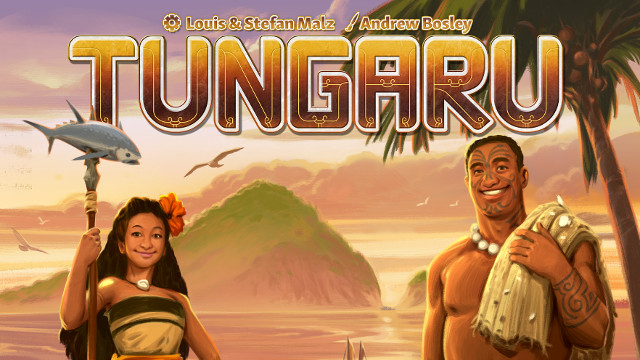Tungaru is set in the Polynesian islands, and your goal is to attract nomads to your tribe. You’ll do this by using dice as workers, and settlers as workers, to sail around the islands, manipulate resources, and ultimately collect nomads, and it’s the moving around that is the most instantly striking aspect of the game. The game board is a series of little islands, varying in size depending on the number of players, and you’ll move your little dice filled boat from island to island, harvesting and trading resources, dropping off your settlers and grabbing the important nomads.
This, to me, is fundamentally where Tungaru starts to fall down. Games are all about interesting decisions and restricting, or limiting, what you can do in those decisions is what makes gaming interesting. Tungaru doesn’t want to restrict you, every aspect of the game, whether it’s moving your boat or harvesting resources can be achieved with little effort. I know some players can get frustrated when a game limits them too much, but I feel that Tungaru has gone the opposite way, allowing you so much freedom that you wonder why the limitations have been put in place at all.
Where the leader mechanic does do something interesting is how once a leader is played it gets passed onto another player. Not only does it stop you playing the same leader over and over but means you could end up with a handful of leaders that you don’t want. I say could, because, again, you never seem to get as limited by this as you potentially could.
It would be remiss of me not to describe Tingaru’s scoring, because here again the game does something clever. Each nomad you collect gives you both a special bonus—either a one-time reward or extra action to choose from—and a scoring condition. There are a number of different scorings, and your goal to combine these as best you can. Choosing which nomad to collect, and therefore, which victory conditions to aim for, is where I think Tungaru does something really clever. You need to keep an eye on what’s available and what your opponents are collecting, and be efficient with your resources as quickly as possible.
I really wanted to like Tungaru. It’s beautiful, is gentle, and although there are a few kinks in the mechanics, it’s easy to get your head around both the rules and the strategies. No one aspect of the game stands out as being bad, quite the opposite in fact, as on the whole the game works really well and even has a few interesting takes on familiar mechanics.
Fundamentally, it's a game that doesn’t want to be mean, a game that restricts you slightly to try and force you into making strategic decisions but doesn’t want to frustrate you with over-complexity or limiting your options.
It’s very nice.
And that’s its problem, by being a nice game it's ended up being a bit dull for me and my group.
Tungaru is a luscious visual treat, wrapped around a solid but gentle euro style-game, that beautifully conveys the tropical paradise on which it’s based. But it's the lack of any real pressure, or even competition, that makes the game a little boring.
Tungaru is on Kickstarter now.
Tungaru is on Kickstarter now.
This Kickstarter preview is based on a prototype version of the game provided by the publisher; the
final product may look, play or smell different to that used in this
preview.






No comments:
Post a Comment